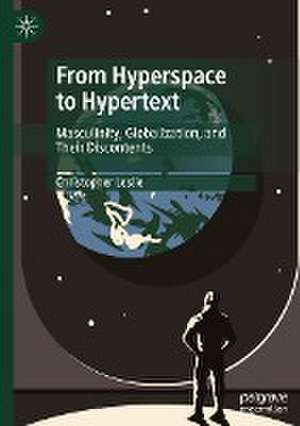From Hyperspace to Hypertext: Masculinity, Globalization, and Their Discontents
Autor Christopher Leslieen Limba Engleză Hardback – 26 sep 2023
Preț: 739.94 lei
Preț vechi: 902.36 lei
-18% Nou
Puncte Express: 1110
Preț estimativ în valută:
141.59€ • 148.32$ • 117.35£
141.59€ • 148.32$ • 117.35£
Carte tipărită la comandă
Livrare economică 08-22 aprilie
Preluare comenzi: 021 569.72.76
Specificații
ISBN-13: 9789819920266
ISBN-10: 9819920264
Pagini: 514
Ilustrații: XXXII, 514 p. 18 illus.
Dimensiuni: 148 x 210 mm
Greutate: 0.8 kg
Ediția:1st ed. 2023
Editura: Springer Nature Singapore
Colecția Palgrave Macmillan
Locul publicării:Singapore, Singapore
ISBN-10: 9819920264
Pagini: 514
Ilustrații: XXXII, 514 p. 18 illus.
Dimensiuni: 148 x 210 mm
Greutate: 0.8 kg
Ediția:1st ed. 2023
Editura: Springer Nature Singapore
Colecția Palgrave Macmillan
Locul publicării:Singapore, Singapore
Cuprins
Part I. The Gernsback Era.- 1. Cosmopolitan Gentlemen of Science.- 2. Planet Smashers of the Second Industrial Revolution.- 3. Have We Not Had Enough of War?.- Part II. The Campbell Era.- 4. Archaeology of the Future.- 5. The Editor with One Hundred Hands.- 6. The Challenges of Inclusion.- Part III. The Merril Era.- 7. Confronting Cold War Masculinity.- 8. The End of Science Fiction.- 9. Science Fiction and the University.
Notă biografică
Dr Christopher Leslie is an independent scholar who has taught at John Jay College of Criminal Justice; New York University Tandon School of Engineering; Universität Potsdam, Germany; and the South China University of Technology, Guangzhou.
Textul de pe ultima copertă
This book illuminates how science fiction studies can support diversity, equity, and inclusion in science and engineering. Shortly before science fiction got its name, a new paradigm connected whiteness and masculinity to the advancement of civilization. In order to show how science fiction authors supported the social construction of these gender and racial norms – and also challenged them – this study analyzes the impact of three major editors and the authors in their orbits: Hugo Gernsback; John W. Campbell, Jr.; and Judith Merril. Supported by a fresh look at archival sources and the author’s experience teaching Science and Technology Studies at universities on three continents, this study demonstrates the interconnections among discourses of imperialism, masculinity, and innovation. Readers gain insights into fighting prejudice, the importance of the community of authors and readers, and ideas about how to challenge racism, sexism, and xenophobia in new creative work. This stimulating book demonstrates how education in science, technology, engineering, and mathematics (STEM) can be enhanced by adding the liberal arts, such as historical and literary studies, to create STEAM.
Dr Christopher Leslie is an independent scholar who has taught at John Jay College of Criminal Justice; New York University Tandon School of Engineering; Universität Potsdam, Germany; and the South China University of Technology, Guangzhou.
Caracteristici
Illustrates how science fiction played a role in the social construction of gender and racial norms Offers important insights on improving diversity, equity, and inclusion in science and engineering Shows how historical analysis can reveal vivid interconnections between imperialism, masculinity, and innovation
